
19 minute read
COMMUNITY
Goals are often a great motivator. They can push us to complete a gruelling athletic event or reach the top of a mountain trail. In other instances, the right goals can help us improve our financial health and stability. needs. For instance, even while you’re working to pay back student debt, you can’t forget about contributing to future savings, or keeping enough cash around to handle any emergency expenses that may come up.
No matter what kind they may be, the best goals are those we succeed in reaching. With personal finance, as with anything, our goals need to be realistic. They need to be based on hard numbers and achievable outcomes.
Advertisement
Good financial goal-setting requires a bit of a balancing act between different priorities, obligations, and expenses. Done right, realistic financial goals can lead to improved financial resilience.
Here’s some advice to think about when setting financial goals.
Be specific about what you want to achieve
Vague, inexact wishes are the enemy of good goal setting. Definable outcomes, however, help establish the steps necessary to reaching your target, whatever it may be. Perhaps your goal is to save for a dream vacation. Maybe you want to purchase property. Or maybe you’re ditching your job to launch a small business. Once you have a clear end point in mind, you can start plotting all the small steps and minigoals along the way that will ultimately lead to a larger achievement.
It begins with a good budget
Understanding where our money goes each month is essential to knowing how to allocate it toward financial goals. The numbers behind good, realistic financial goals will be based on the real spending habits in your budget, so make it accurate and detailed. Once you’ve built a budget to keep tabs on your spending, you’ll need to stay up to date on the numbers and make sure you’re staying on track. From time to time, you may also need to adjust your budget to account for any changes to monthly income or spending.
Set goals for different life stages
Financial planning is a lifetime job, with changing needs and demands as you progress along your path. That means you need goals that account for all three of your short-term, medium-term, and long-term financial
Be willing to roll with some punches, and readjust as required
Whether we like it or not, life happens. As you pursue your financial goals, unexpected expenses will no doubt arise from time to time, interrupting your progress and forcing a temporary reallocation of resources. Although it’s certainly irritating to fall short of financial targets, don’t be discouraged when expenses throw you for a loop. Get back on track as soon as your budget and circumstances permit and update your timelines and targets if necessary. Being flexible and adaptable will help you get to the finish line and turn your financial goals into reality.
Find a buddy to support your journey to financial goals
Achieving financial goals is always easier when it’s done with trusted support. Whether it’s a partner, friend, or financial professional, find someone (or several people) you can turn to for encouragement, understanding, and accountability. Be willing to share your goals and ask your supporters to do their part to help keep you on the path to achieving them.
This article is not intended to provide financial or financial planning advice, please call or email Moya Financial and they will be more than happy to chat with you!
MOYA FINANCIAL
747 Brown’s Line, Toronto, ON M8W 3V7 Call: 416.255.1742 Email: main@moyafinancial.ca
ETOBICOKE LAKESHORE PRESS

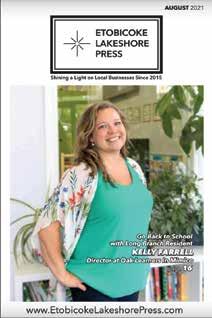

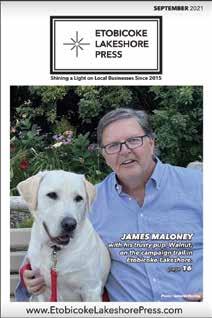






PROMOTE YOUR BUSINESS IN SOUTH ETOBICOKE!
Contact Roger Tumminieri, Publisher etobicokelakeshorepress@gmail.com (416) 788-0716


Welcome to 2022 at Humber College’s Lakeshore campus!
My name is June MacDonald-Jenkins, and I am the new Senior Dean of the Faculty of Social and Community Services and the Principal of the Lakeshore campus. What an incredible opportunity it is for me to highlight the incredible activities and work of our students, faculty and staff at the Lakeshore campus and its impact on the community in this submission.
In this issue we want to draw your attention to some great milestones and accomplishments:
Five years of the Lakeshore Grounds Interpretive Centre.
One of our strongest connections to the community is through the Lakeshore Grounds In celebration of the Interpretive Centre’s fifth birthday, the team is putting together a new exhibition highlighting the Centre’s values and dynamic history.
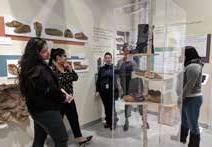
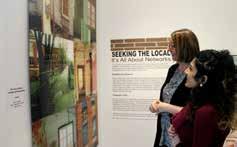
Interpretive Centre. This month marks its fifth anniversary.
Since its inception, the Interpretive Centre has served as a unique cultural resource. It first opened in 2017 inside the Student Welcome and Resource Centre.
Established with the mission to research, preserve, and share the natural and built heritage of the Lakeshore Grounds, the Interpretive Centre has been a unique hub for both students and the Etobicoke-Lakeshore community to engage with artefacts and artwork that offer a diverse perspective of the region’s compelling history.
To date, the Centre has hosted 20 exhibitions on campus. These exhibitions centre on core themes: Indigenous heritage, mental health, education and environmental sustainability.
In March of 2020, the Interpretive Centre team went fully remote but flourished online with virtual programming, including a series of digital exhibits, tours and interactive arts-based workshops.
The exhibition will invite community members to reflect on the unique stories shared by the Interpretive Centre and preview its future programming.
Visit LakeshoreGrounds.ca to access the Interpretive Centre’s ongoing digital programming. You can also find them on Facebook, Instagram and Twitter at @LakeshoreGrnds for updates on all upcoming events and exhibitions taking place in 2022. Claire Buchanan
Student success
I am pleased to share so much good news this month. I’d like to take this opportunity to introduce you to one of our exceptional students making a splash this year at Humber. You will likely hear her on Radio Humber if you’re a regular listener, and if not, you will hear her on a sportscast soon.
Claire Buchanan is a para sport advocate, multi-sport athlete, single mother and speaker who brings awareness to para hockey. As an athlete ambassador, she speaks to groups of young women across Canada, including rural communities where para-sports are harder to access.
Claire’s athleticism and advocacy have created the perfect platform for her next endeavour, a career in radio broadcasting.
She is as outspoken about Humber as she is about para-sport. Claire recently shared that Humber is critical to her training regimen. She uses the services of our massage therapy students at Humber’s North campus.
“As a disabled athlete, we would only really see our registered massage therapists (RMTs) and physiotherapists at training camp. During COVID, I haven’t had access to any of those services,” she said. “I want to make sure I don’t run into injuries and stay healthy as an athlete. The fact that the school I’m going to offers massage therapy and I can access it in between classes has been huge,” said Buchanan.
Claire’s appointments enrich the massage therapy students’ learning. She says that most RMTs have never treated a disabled athlete, and she’s happy to help educate them about her sport and how her body works.

To learn more about Claire, you can listen to her podcast, The Neutral Zone, which she produces with four of her friends who are also disabled athletes. She will graduate from Radio Broadcasting in 2023.
I look forward to sharing more about our beautiful Lakeshore campus and our incredible students in the coming months.
The sledge hockey season is ramping up for the first time in two years since the pandemic shut down most high-performance sports camps and events. JUNE MACDONALD-JENKINS
Sr. Dean Faculty of Social and Community Services Principal, Lakeshore Campus

What does it take to start a business? What does it take to start a business during a pandemic?
In my opinion, it takes courage, commitment, and community.
Here’s what Long Branch resident and owner of Lakeshore Smiles Dentistry, Dr. Payal Seth, had to say about what inspired her leap of faith, her commitment to ensuring the safety of her staff and patients, and what sets her practice apart from others...
“Starting a new business requires a lot of planning and execution especially during the pandemic,” she explains. “Like every other small family business, we had our apprehensions, too, and since I took over this practice right at the onset of the pandemic, there was a lot of uncertainty on how things would shape out. But being in the healthcare/ dental field, I knew that communities would need essential and emergency dental care for their well being and I was fortunate that once the restrictions were lifted, our patients came back for their regular check ups and pending treatments that were delayed due to the restrictions.
“Opening a business during the pandemic was highly challenging but the safety of our patients and staff has always been our top priority,” she continues. “With new guidelines from our governing body and Public Health, we made alterations in our clinic where we enclosed all of our operatories by installing barriers at the doors, optimized the ventilation, and placed high efficiency HEPA filtration units. In our waiting area, the chairs are spaced 2 metres apart and we no longer offer any reading material, magazines, toys and refreshments. We also made administrative changes to optimize processes and workflows to minimize potential contact. The patients are pre-screened with a Covid questionnaire before and on the day of their appointment. The appointments are spaced out between patients to allow physical distancing. Our staff also has to go through a series of questions and temperature checks before starting their shift. We are equipped with PPE’s and our team is vaccinated against Covid-19.
“My approach as a dental practitioner is to work collaboratively with my patients to understand their goals and provide the utmost care. Our team strives to provide a comforting environment to our patients from the time they call to book their appointment until their treatment is completed. The team of dentists, hygienists and administrative staff at our clinic always encourage our patients to ask questions and we happily answer them throughout the course of the treatment. We also do direct billing to insurance and offer flexible payment plans to patients who do not have insurance coverage.”
Being the curious fellow that I am, I tend to want to know what draws folks to South Etobicoke and, specifically, Long Branch. If you’re reading this, it’s very likely that you understand how special this community is. So why did Dr. Seth and her family decide to move here and open up a dental practice?
“When I was doing my research for a suitable location for owning a dental practice, Long Branch was on top of the list for various reasons,” she explains. “Long Branch is one of the most vibrant and up-and-coming communities in the GTA with a great mix of young families, working individuals, seniors, and students. This neighbourhood has a unique history, offers a great lifestyle with recreational spots for the community, and its proximity to the GO station and transit that connect you directly with the city were all selling point for me.
“Being parents of a toddler girl, we always wanted to raise our daughter in a community that has access to childcare, great schools, lush green parks and, as nature lovers, the proximity to the waterfront was the icing on the cake for me and my spouse to call this beautiful neighbourhood Home,” says Dr. Seth. “Moreover, my clinic and house are walking distance from Marie Curtis Park, which is where you will see me spending most of my time in the summer after work with my family.”
So, what does the future hold for Dr. Seth and Lakeshore Smiles Dentistry?
“I believe that one is a student for life and should continue to learn with every opportunity,” explains Dr. Seth. “I consider myself to be fortunate in a field that is ever evolving and provides us with various opportunities and channels to learn. Being trained at one of the most prestigious dental schools in North America, my passion for learning and upgrading myself has never been conceded. I love to keep myself abreast of new advancements and techniques in dentistry by taking continuing education courses. I aspire to update myself so that I can provide great care to my patients with the latest tools and techniques.
“As we head into the new year, I would urge readers to focus on overall health and well being. I would also like to thank the community for giving me and my team an opportunity to serve them over the last year and half. I will leave you with this quote...”
“Live as if you were to die tomorrow. Learn as if you were to live forever” – Gandhi
DR. PAYAL SETH
Lakeshore Smiles Dentistry, 3867 Lake Shore Blvd. West 416.503.3000 www.lakeshoresmilesdentistry.com

BRAD JONES
Owner, Ridley Funeral Home
Have you ever heard of the “widow’s diet”? Don’t get too excited. The diet isn’t a New Year’s miracle capable of shrinking those old Covid curves and new Christmas bulges.
Tea and toast is a common “meal” prepared by the broken-hearted.
Sure, when we’re bored, we eat. But when we’re bereaved, we ban food from our priorities. If you’ve ever failed on any sort of diet (I have! I have!), you know that food is one of the great joys in life, a powerful source of memory, tradition, community and belonging.
“Comfort food” feeds our mind, body and spirit so it’s no surprise that sadness easily and steadily erodes a grieving person’s desire for proper nourishment and tender self-care.
I have made at-home visits to more than 5000 elderly widows and widowers over the years and if there’s one thing I know for sure: tea and toast are the daily menu, especially in the first weeks of bereavement. (Yup, your tuna casserole is that important to the future of community and humanity.)
Death is a master teacher to the left behind. Facing death and surviving its impact changes the trajectory of our lives. In light of that dark reality, who possibly has time or inclination to cook, eat and be merry when our world is being burned and bulldozed? A loved one’s death is a constantly changing constellation; life gets divided between a blown-apart “before” and a terrifying “what now?” slideshow of fear, loneliness and anxiety.
(If bereavement sounds a lot like pandemic living, you are correct. Please, turn off the news, give yourself a respite from doom and you’ll soften your head and heart.) One of the many reasons why being a funeral director adds meaning and depth to my life is that I am permitted to take care of people, both the living and the dead.
Whether they stand in front of me weeping or they reach out from beyond the grave through stories, my work continually forces me to look at where I am out of alignment or out of integrity in my own life.
As always, death teaches us fundamental truths about living well, living wisely and living kindly. Life is not long, people. Sure, funeral directors know how the shows ends but you’d be amazed at how often we too get overwhelmed and scattered by the daily circus called “busy, busy.”
Despite my long-time belief in the “eat, eat, eat, you’ll feel better” approach to life that I regularly share with grieving families (and sometimes myself at 3 a.m.), imagine my surprise when I discovered that I too had fallen into the disastrous tea-and-toast diet.
As anyone who’s suffered a life-altering disappointment knows, whether we’re knocked down by divorce, disease or depression, our ability to taste and savour the joy of life is diminished while navigating a new, darker world.
Take, for example, my personal and professional circus a number of years ago. I spent 25 years commuting from Hamilton to Toronto for work, eager to make a long-time vision real: moving my family into the apartment above Ridley’s, our funeral home here in Etobicoke. A big goal demands big energy and I had an infinite amount of energy and ambition to burn, or so I thought.
My life-altering mistake was one the majority of women, especially mothers and/or daughters caring for elderly parents, understand and have suffered through.
I put everyone’s needs, both at work and at home, ahead of my own well-being. I ran my life like it was a race until my emotional health faltered, followed by my physical health collapsing and gasping “enough”.
Death didn’t come for me (that would be super weird if I were dead and still writing but it would be sort of cool) but Death did send two of its toughest cousins – grief and transformation.
Working 10-hour days, acting on community and association boards, coaching soccer/football/ basketball for my six kids (ages 11 to 27), running a small business, staying out of my wife’s way, caring for my grieving father. Everything that was important stopped when I got sick.
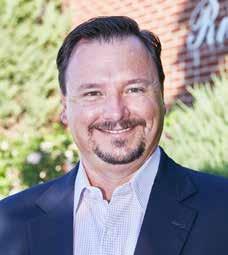
What didn’t stop? The people I loved stepped up and helped the sick man (me) in the hospital bed. I couldn’t walk, I couldn’t lift anything, and no one knew what was wrong except that something was very, very wrong.
I share this story not for pity but for passion and perspective. How many wishes do you have right now? Probably a lot, right? I mean, Santa is always listening.
But for sick people they have only one wish: to be healthy again. (If you’re wondering, dying people who accept their inevitable fate only have one wish: to feel peace and be allowed to let go and leave.)
When life goes off the rails, we know there’s something new in the oven. We cannot discern what cake is baking; it could be delicious or poison. We just don’t know to what degree life is going to brighten or darken.
But during times of tremendous change we are called to remind ourselves, and others, of what matters and what works.
Being angry at myself doesn’t work. Hating my body doesn’t work. Blaming others doesn’t work. Feeling self-pity and self-loathing doesn’t work. Eating nothing but tea and toast doesn’t work.
Just like the bereaved once they’re gifted with time and intention to heal, from my hospital bed I was able to reframe and redirect my life. I started to notice who came to visit me (and who didn’t because they were “busy”), who tried to feed me (everyone) and who never succumbed to fear and despair (my wife).
I believe the most patient person on the planet would eyeroll if they were informed, like I was, that chronic stress was strangling my good health and good tidings.
I had an impressive and rare autoimmune disorder yet long-term treatment was focused solely on reducing stress and taking time for myself. I was told not to sweat the small stuff. Say that to someone making a 12-course Christmas dinner with the in-laws in the living room and kids stampeding over their feet!
My doctors delivered a ridiculous piece of advice. And a transformative way to live, love and stay present.
When life is joyful or at least mundane and routine, we push ourselves into the future, confident people, places and things will be upgraded into better, happier, richer, best. The dying and dead teach me so much every day, and for them and their families, I am forever grateful. (You didn’t see that coming, did you? I realize I write words that make the average person uncomfortable: dying, death, grief, God, faith, hope, funerals, prayer, tuna casserole.)
But how often do we, the living and left behind, take good, good care of our mind, body and spirit when we’re in pain or feeling afraid? By taking care of ourselves kindly, patiently and lovingly, we strengthen the pillars holding up a meaningful and merry life that supports not just you but those who love and rely on you.
As this new year unfolds, I am stepping away from sharing my stories, thoughts, wishes and dreams in print. I am not going anywhere but, like you, I am changing.
I’ll still be working and running Ridley’s, living upstairs with my wife and our circus animals (‘member the six kids?), and slowly but surely getting back to the community involvement I’ve missed so much.
If you see me walking with Arthur, our family dog and therapy-dog-in-training, please stop and say hello. Taking time for ourselves doesn’t just mean being alone. We are social creatures wired for storytelling, belonging, laughing, hugs and tears. (See? I’m telling you, funerals offer strength and sweetness.)
As we journey further into the shadow of winter and move toward a new season, always remember that life is more than tea and toast.
Sadness and disappointment, fear and loss will always invite us into the dark so we can heal and emerge anew. So often we forget that when we shine our light by taking care of ourselves, darkness and fear vanish.
You are the light of the world and that light is the love and legacy you get to leave behind.
It really is a beautiful life. Enjoy your time here. You chose to be here, to bring the light and the love, and we are grateful.
Happy New Year, thank you for reading and God bless you.
Brad Jones is president of locally-owned, commissionfree Ridley Funeral Home (3080 Lakeshore Boulevard) in Etobicoke. Although he is saying “farewell” to these pages, you are always welcome to reach out to Brad and ask for help, a hug or any kind of healing you need. You are not alone on this journey called life. Brad can be reached at 416-259-3705 or Bradjones@ridleyfuneralhome.com .Going forward and forever, please know that every individual, every family is welcome to gather and grieve at our funeral home.


